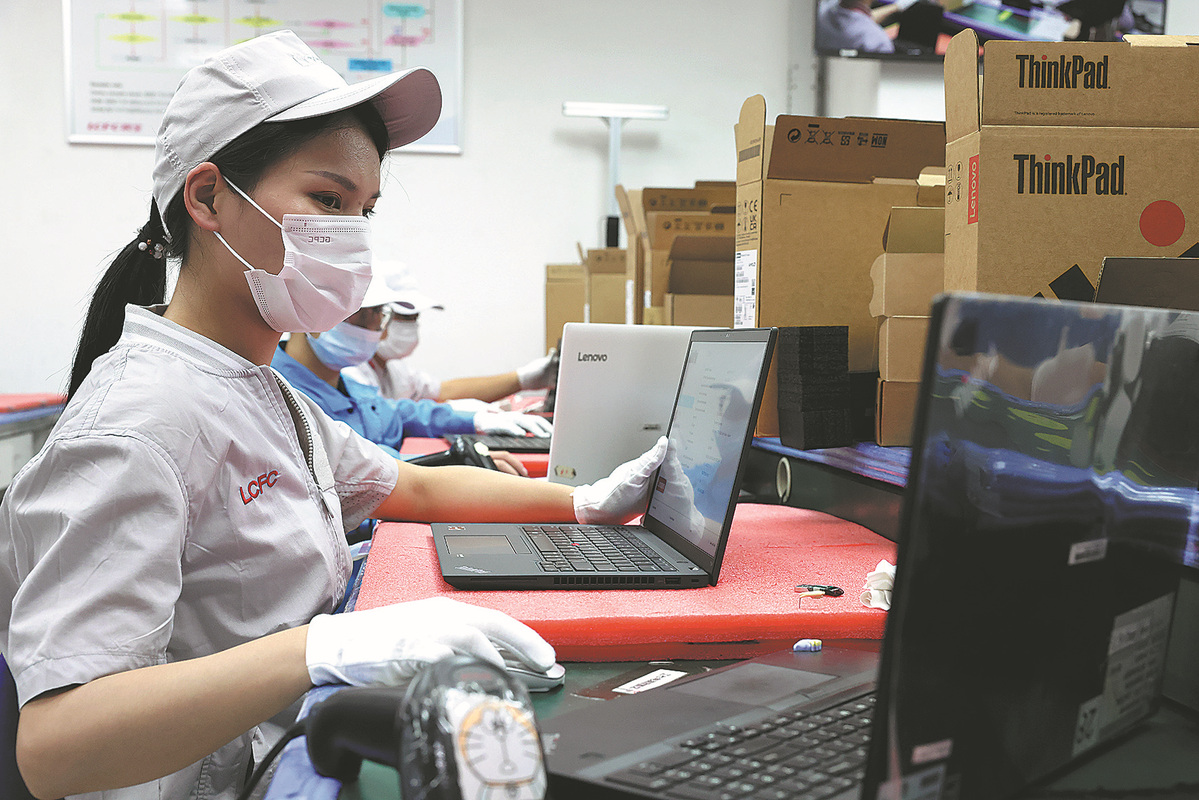Lenovo facility recognized by World Economic Forum

Employees run tests on personal computers at Lenovo's LCFC factory in Hefei, Anhui province, in July. The factory was recognized as one of 18 additional sites added to the World Economic Forum's Global Lighthouse Network in January. [FENG YONGBIN/CHINA DAILY]
To see how advanced manufacturing technologies are reshaping the consumer electronics industry, an example worth looking at is the world's largest single personal computer factory in Hefei, Anhui province.
The LCFC factory, owned by PC maker Lenovo Group Ltd, demonstrates how it is embracing cutting-edge digital technologies to boost efficiency and lower energy consumption amid fierce competition, significant demand fluctuation and growing need for customized products.
The factory has deployed over 30 fourth industrial revolution flexible automation and advanced analytics use cases, improving labor productivity by 45 percent and reducing supplier quality issues by 55 percent, while managing small-size yet numerous customer orders — 80 percent of which are less than five units — according to the World Economic Forum.
The LCFC factory was recognized as one of 18 additional sites added to the World Economic Forum's Global Lighthouse Network in January this year. The Global Lighthouse Network is a community of production sites and value chains that are world leaders in the adoption and integration of cutting-edge technologies.
Established in 2011, LCFC ships products to 126 markets around the world. This is done while managing 300,000 individual pieces of materials and parts every day, and unveiling 300 new products every year with more than 200,000 different product configurations.
Yang Yuanqing, chairman and CEO of Lenovo Group, said, "China is at a critical stage of moving from being a manufacturing powerhouse to a smart-manufacturing center, which will generate more opportunities."
Yang said Lenovo has more than 30 manufacturing bases in countries such as China, Argentina, Brazil, Germany, Hungary, India, Japan, Mexico and the United States, which provide products and services to 180 markets.
The company has established a stable cooperative relationship with 5,000 global suppliers. Such a sprawling supply chain network reflects the importance of international cooperation in manufacturing, Yang said.
Lenovo said digital intelligence technology has played a significant role in upgrading its LCFC factory, with a focus on production scheduling, planning and dynamic operation of the factory's 36 intelligent production lines. This has resulted in significant efficiency gains for scheduling and inventory management, meaning that a completed PC is delivered off the production line every half second.
Moreover, Lenovo said LCFC's focus on research and development and being a center for advanced manufacturing technologies — with a particular emphasis on sustainability — has also resulted in 121 authorized patents in the field of intelligent manufacturing.
One of LCFC's other notable innovations is low-temperature technologies developed to improve PC manufacturing by conserving energy and increasing reliability. Lenovo uses best practices from LCFC across its global manufacturing footprint to support the wider industry ecosystem's digital transformation.
Data from market research company Gartner Inc showed that Lenovo jumped seven places in a year to No 9 on its list of Global Supply Chain Top 25 for 2022. The recognition highlights Lenovo's leadership as a purpose-driven organization and operational center of excellence in the global supply chain community, Gartner said.
Lenovo is also expanding its global manufacturing footprint with a new factory that opened in Ullo, Hungary, last year. The plant focuses on building server infrastructure, storage systems and high-end personal computer workstations used by its customers throughout Europe, the Middle East and Africa.
Covering almost 50,000 square meters across two buildings and three floors, it is Lenovo's first in-house manufacturing facility in Europe. The production line can produce more than 1,000 servers and 4,000 workstations per day — each one built specifically to customer requirements.
Li Xianjun, an associate researcher at the Institute of Industrial Economics at the Chinese Academy of Social Sciences, said, "Advanced manufacturing is playing an increasingly crucial role in bolstering technological innovation, advancing new industrialization and fostering high-quality development."
Li said China's emphasis on the real economy and the development of advanced manufacturing through intelligent digital technologies will help make China's economy more resilient, strengthen the capacity to buffer against external risks and shocks and build the country into a manufacturing powerhouse.
- Roundup: Lenovo launches tech summit featuring latest AI innovations
- Full text: Speech by Chinese premier Li Qiang at the opening ceremony of the World Economic Forum Annual Meeting 2024
- Chinese premier meets with executive chairman of WEF
- World Economic Forum Annual Meeting 2023 in preparation
- MSCI upgrades Lenovo's ESG rating to AAA


